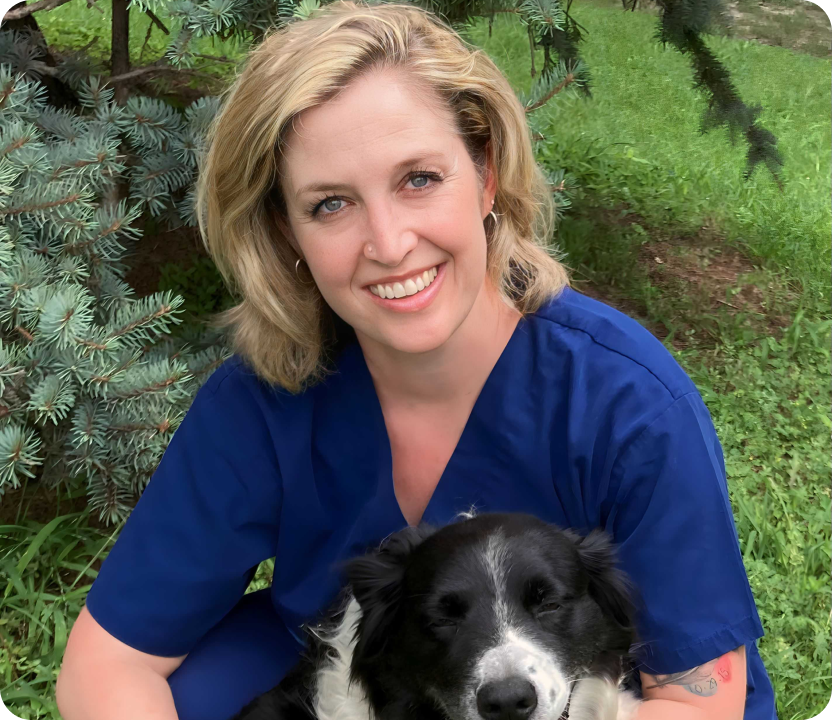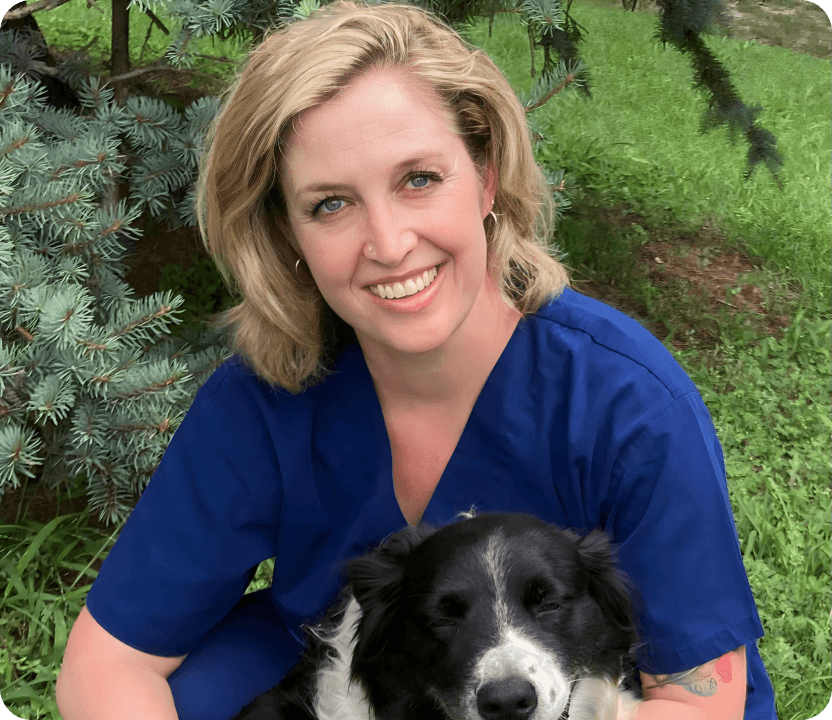In this article, we’ll highlight the sneaky signs of dog mouth pain and provide guidance on how to address these issues, ensuring your furry friend receives the care they need for optimal dog mouth health.
11 Sneaky Signs Your Dog’s Mouth Hurts

Key facts:
- Dogs are masters at hiding pain, making it crucial for pet parents to notice subtle signs of discomfort.
- Changes in behavior, such as increased irritability, reduced playfulness, or unusual noises while eating, can signal that your dog is experiencing mouth pain.
- Regular brushing, providing dental chews, and routine veterinary visits are essential practices for maintaining your dog’s oral health and preventing dental disease.
- A number of issues can cause mouth pain – not just dental problems.
- Always seek veterinary advice if you think your dog is in pain.
Dental health is a crucial aspect of your dog’s overall well-being. However, mouth pain in dogs can often go unnoticed due to their natural tendency to hide discomfort. This makes it essential for pet parents to be vigilant and recognize subtle signs that might indicate their dog’s mouth is hurting.
Common Causes of Mouth Pain in Dogs
Mouth pain in dogs can stem from various issues, ranging from dental issues to foreign objects stuck in the mouth. Here are some common causes:
- Dental Disease: Conditions such as gingivitis and periodontal disease can cause significant discomfort and lead to more severe oral health issues if left untreated.
- Broken or Fractured Teeth: Trauma or chewing on hard objects can result in broken teeth, causing pain and difficulty eating.
- Oral Infections: Bacterial infections in the mouth can lead to painful abscesses or other complications.
- Foreign Objects: Objects like bones, sticks, or even small toys can become lodged in a dog’s mouth, causing irritation and pain.
- Oral Tumors: Tumors in the mouth can be benign or malignant, but either can cause discomfort and require immediate veterinary attention.
- Abscesses: These are pockets of infection that can form in the gums or under the teeth, leading to significant pain and swelling.

Sneaky Signs Your Dog’s Mouth Hurts
1. Reluctance to Eat
One of the most telling signs of dog mouth pain is a reluctance to eat. Dogs might avoid hard or crunchy foods that exacerbate their discomfort. Signs to watch for include dropping food, eating slowly, or outright refusing to eat. This can also lead to weight loss, which is another indicator of potential oral health issues.
2. Bad Breath
Persistent bad breath is more than just a nuisance; it can be a sign of oral infections or dental disease. Regular dental exams and professional dental cleanings by your veterinarian are crucial for diagnosing and treating these conditions, which can lead to more serious health issues if ignored.
3. Drooling
Increased drooling can be a sign of pain or discomfort in the mouth. While drooling can also occur for other reasons, such as nausea or excitement, it’s important to get a veterinary diagnosis if it’s accompanied by other signs of mouth pain.
4. Pawing at the Mouth
If your dog is pawing at their mouth or face, it may indicate that something is causing them discomfort. This behavior can be a clear indicator of oral issues, such as a toothache or a foreign object stuck in the mouth.
5. Facial Swelling
Swelling around the mouth or face can signal infection, abscess, or dental issues. If you notice swelling, it’s crucial to seek veterinary care immediately, as these conditions can quickly worsen without treatment.
6. Changes in Chewing Habits
Dogs experiencing mouth pain may chew on one side of their mouth to avoid discomfort. If you notice a change in your dog’s chewing habits, such as favoring one side or avoiding certain types of food, it could be a red flag, and you should consult your veterinarian as soon as possible.
7. Reduced Playfulness
Oral pain can lead to a decrease in playfulness, especially if your dog enjoys playing with chew toys. A noticeable or sudden decrease in activity levels can indicate that your dog is in discomfort and needs attention.

8. Dog Bleeding from the Mouth
Bleeding from the mouth can be a concerning sign of various oral issues. This could be due to gum disease, trauma, oral tumors, or foreign objects lodged in the mouth. Even minor bleeding warrants a veterinary visit to determine the underlying cause and appropriate treatment. Persistent bleeding is especially concerning and should be addressed immediately to prevent further complications.
9. Behavioral Changes
Increased irritability or aggression can be signs of pain. If your normally friendly dog becomes snappy or withdrawn, it could be due to mouth pain. Behavioral changes often signal an underlying health issue that requires attention.
10. Weight Loss
Chronic mouth pain can lead to reduced food intake and subsequent weight loss. It’s essential to monitor your dog’s weight and eating habits closely, as unexplained weight loss can indicate a serious problem.
11. Unusual Noises While Eating
Whimpering, whining, or other unusual noises while eating can indicate pain. Pay close attention to these sounds during mealtime, as they can provide important clues about your dog’s oral health.
What to Do If You Suspect Your Dog’s Mouth Hurts
If you suspect your dog is experiencing mouth pain, it’s crucial to seek veterinary care for a proper diagnosis. During an exam, your veterinarian will look closely at your dog’s teeth, mouth, and gums. They may use a canine dental chart to note teeth that need attention or take dental X-rays for a better look at the bones and structures surrounding your dog’s teeth.

Dental X-rays in pets are taken under general anesthesia, so are typically done at the time of the dental cleaning.
Dr. Jennifer Rowan-Hitchcock
Depending on the findings, your veterinarian may recommend additional diagnostics and treatments such as dental X-rays, dental cleanings, tooth extractions, or medications to alleviate pain and address the underlying cause.
Tips for Maintaining Your Dog’s Oral Health
To avoid dental problems and mouth pain in dogs, make sure to keep up with regular pet dental care. This includes at-home tooth brushing and professional veterinary dental cleanings. The following advice can help your dog avoid mouth problems:
- Regular Brushing: Brush your dog’s teeth regularly to prevent plaque buildup and reduce the risk of dental disease. Brushing one to three times weekly with a veterinary-approved toothpaste for dogs is recommended by veterinary dentists.
- Chew Toys: Keeping your dog’s teeth clean doesn’t have to be a chore – dental toys can make it a fun and engaging process for your furry friend. They are specifically designed to help maintain oral hygiene by scraping off dirt and tartar as your dog chews, promoting a healthier mouth and fresher breath.
- Diet: Crunchy vegetables like carrots, celery, and apples can help clean your dog’s teeth. Their abrasive action can help naturally remove tartar and dirt build-up as they chew.
- Routine Veterinary Visits: Schedule regular veterinary check-ups to monitor your dog’s dental health and catch any issues early.
Final Thoughts on Dog Mouth Pain
Recognizing the sneaky signs of mouth pain in dogs is essential for their overall health and well-being. By being attentive to changes in your dog’s behavior and maintaining regular pet dental care, you can prevent and address oral health issues before they become severe. Always seek support and help from your veterinarian if you suspect your dog is in any pain.
Sources
 B
B




